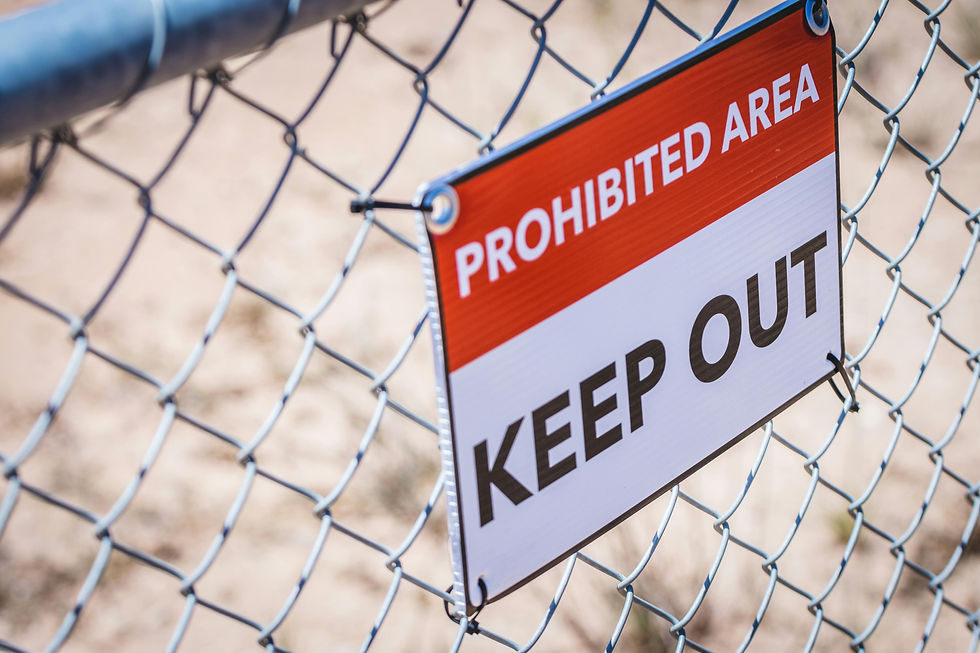The Truth about Boundaries: A Biblical Approach
- Oct 31, 2025
- 4 min read

When I was growing up, nobody talked about boundaries or therapy. We now see an entire generation that has been raised to seek emotional safety and understand how to set boundaries. Can we agree that the culture has shifted?
Boundaries are emotional, mental, and physical property lines that distinguish between you and someone else.
Boundaries include: feelings, intellect, verbal, body, sex, property, finances, and time
You cannot control or manage someone else’s house, but you can manage your own.
In other words, if someone crosses your expressed boundaries, you have the right and responsibility to manage your response and limits.
It sounds like this: If you do this, I will do that, or I will not do that.
For example, if someone did not call and you waited over an hour, your boundary may be, “My time is very valuable to me. If you are interested in rescheduling, I will not be able to do it on the weekend.”
Now that we understand how boundaries work, let’s consider the advantages and challenges of this cultural shift.
Advantages:
Increased self-awareness and emotional regulation
Decreased sense of powerlessness and victimization
Ability to identify toxic patterns and boundary violations
Requires one to slow down and process how to respond instead of reacting
Empowered language to communicate one’s needs and limits
Boundaries sound really good and healthy. The problem is they are self-seeking and founded on earthly, sensual, and sometimes demonic wisdom (James 3:14-15). Your personal boundaries may be right, but is it at the expense of righteousness, submission, or obedience? As an Ambassador of heaven, you must renew your mind to the Kingdom of God and put everything under the light of His Word. Self-set boundaries are typically based on your will and comfort and exclude the will and Word of God.

In my humble view, boundaries should be set by the Holy Spirit and not your feelings or comfort. On the altar of surrender, you are to lay down your life for the life of Christ (I John 6:13). If you are a follower of Christ, you have agreed to deny yourself, take up your cross and follow Him: you are now a living sacrifice (Matthew 16:24, Romans 12:1). As a believer, you are empowered to live in the grace of “nevertheless, not my will but Your will be done (Lue 22:42).” You are to crucify your desires and flesh and not seek to live a life of emotional comfort (Galatians 5:24).
Does that mean that Christians are called to be doormats? Sometimes it will feel that way, but not all the time. It depends on the will of the Father and how active your flesh is. Don't reason without Him: Seek His will above your own. For there is a way that seems right to man, but it leads to the road of destruction (Proverbs 14:12). Your boundaries set independent of God may seem right, but may lead you to an outcome outside of life in Christ.
Jesus, our example, said He only did what He saw His Father do (John 5:19). So when he flipped a table in the temple and drove out the merchants, He was doing the will of the Father (Matthew 21:12-13). Yet, He also was stating the will of the Father when He said “turn the other cheek” and forgive seventy times seven when someone hurts you (Matthew 5:39; 18:22). If Jesus set his own boundary, He would have set a limit with Judas when he reached for the bread at the last supper (Matthew 26:17-30). He would have told the Father in the Garden of Gethsemane that He was asking too much and violating His personal rights (Luke 22:42). IfJesus was focused on emotional safety, He would not have restored Peter after he denied Him (John 21:15-17).
When we set our boundaries above God’s will, we get in trouble. Jonah set his own boundary and refused to go to Nineveh; consequently, he almost cost others their lives and ended up in the belly of a whale for three uncomfortable days (Book of Jonah). On multiple occasions, God set a boundary for Solomon to leave those strange women alone. He didn’t listen and ended up bowing to other gods and accumulating 700 wives and concubines (I Kings 11:1-9).
This is the point…
The safest place for you is in the will of God. It may not be comfortable, but it is safe. Your flesh will die, but through your obedience, the outcome over time will be God. You may not always know what He is doing, but it is always for good. Often, He is sanctifying and pruning you. Other times, you are modeling forgiveness, grace, and mercy. And yes, sometimes He will ask you to speak up and set clear boundaries. Regardless of God’s why or how, allow Him to be the author and finisher of your faith. Lay down your life, crucify your flesh, discern the will of the Father concerning you, and allow God to be the boundary setter.
Author: Malika King 10/19/2025
© 2025, All rights reserved







Comments